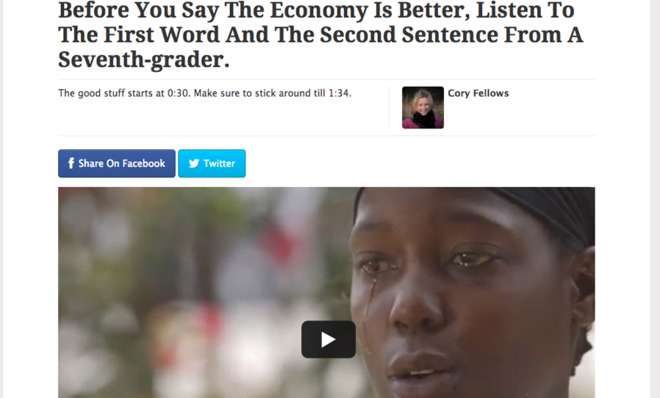I Didn't Think I'd Love This Upworthy Headline Generator. Boy, Was I Wrong.
So great.

A free daily email with the biggest news stories of the day – and the best features from TheWeek.com
You are now subscribed
Your newsletter sign-up was successful
The most popular Upworthy story of all time contains the word "wondtacular."
The post in question is about a talented 14-year-old musician who recently lost his battle with terminal cancer, and it has been viewed 17 million times and counting. It's very touching. You may have already come across it in your Facebook feed.
And if you haven't, chances are you have already encountered something eerily similar. Perhaps it was the site's second-most viewed post of all time: "See Why We Have An Absolutely Ridiculous Standard of Beauty In Just 37 Seconds" (11.8 million pageviews). Or maybe it was the instant classic: "His First 4 Sentences Are Interesting. The 5th Blew My Mind. And Made Me A Little Sick" (4.9 million). There are many, many others, and they all follow the same basic template.
The Week
Escape your echo chamber. Get the facts behind the news, plus analysis from multiple perspectives.

Sign up for The Week's Free Newsletters
From our morning news briefing to a weekly Good News Newsletter, get the best of The Week delivered directly to your inbox.
From our morning news briefing to a weekly Good News Newsletter, get the best of The Week delivered directly to your inbox.
This, my friend, is the wondrous world of socially engineered content. And we might as well get used to it.
For the unfamiliar, Upworthy is a progressive website built around the idea that heart-warming, life-affirming content — in this case, obscure YouTube videos unearthed by the site's editors — deserves to be put in front of as many eyeballs as possible. This is accomplished almost exlusively through social media channels like Facebook.
To give a video wings (the "up" part), Upworthy contributors write dozens of headlines for each story designed for the sole purpose of plucking your heartstrings. Then they pick the one most likely to spark an emotional reaction.
BuzzFeed's John Herrman called it 2013's reincarnation of the internet chain letter. The Atlantic's Derek Thompson, on the other hand, dubbed Upworthy "the internet's latest viral wizard."
A free daily email with the biggest news stories of the day – and the best features from TheWeek.com
The site's overwhelming success is enviable. At just 17 months old, Upworthy attracted 46.7 million unique visitors this past October according to ComScore, making it much more popular than many news sites. Its earnestness, exemplified by its sticky-sweet two-sentence headlines, has already been duplicated by a host of imitators, some unabashed in their flattery (Viral Nova) and others still finding their footing (Viral Conservative). Even the venerable Washington Post has launched an Upworthy-style vertical.
Ryan Holiday at Betabeat writes that what these sites (which include BuzzFeed) have in common is that they have mastered the art of "filtering and exclusively delivering only a small sliver of reality — one that is all sweet and no sweat." They provide a quick endorphin rush to make you feel warm and fuzzy — and, hopefully, generous with your clicks.
Which isn't a bad thing! But with all that success comes the inevitable blowback, which in this case has manifested itself in the Upworthy headline generator created by former BuzzFeed and Google employee Mike Lacher.
The single-serving site, which is "in no way affiliated with Upworthy," pokes fun at some of the Upworthy's more cloying attempts to snare clicks from your Facebook friends. It's quite funny, too:


I think part of the Upworthy generator's appeal is that it mockingly strips away the warm veneer that can make Upworthy feel one-dimensional. It's a gentle reminder to the feel-good economy that the world is sometimes awful and largely indifferent, and that armchair inspiration still takes place, well... in an armchair.
To say Upworthy does more harm than good is downright silly. But like most things, it's best enjoyed when you know a bit about how it actually works.
HT: Joe Puglisi
-
 The ‘ravenous’ demand for Cornish minerals
The ‘ravenous’ demand for Cornish mineralsUnder the Radar Growing need for critical minerals to power tech has intensified ‘appetite’ for lithium, which could be a ‘huge boon’ for local economy
-
 Why are election experts taking Trump’s midterm threats seriously?
Why are election experts taking Trump’s midterm threats seriously?IN THE SPOTLIGHT As the president muses about polling place deployments and a centralized electoral system aimed at one-party control, lawmakers are taking this administration at its word
-
 ‘Restaurateurs have become millionaires’
‘Restaurateurs have become millionaires’Instant Opinion Opinion, comment and editorials of the day